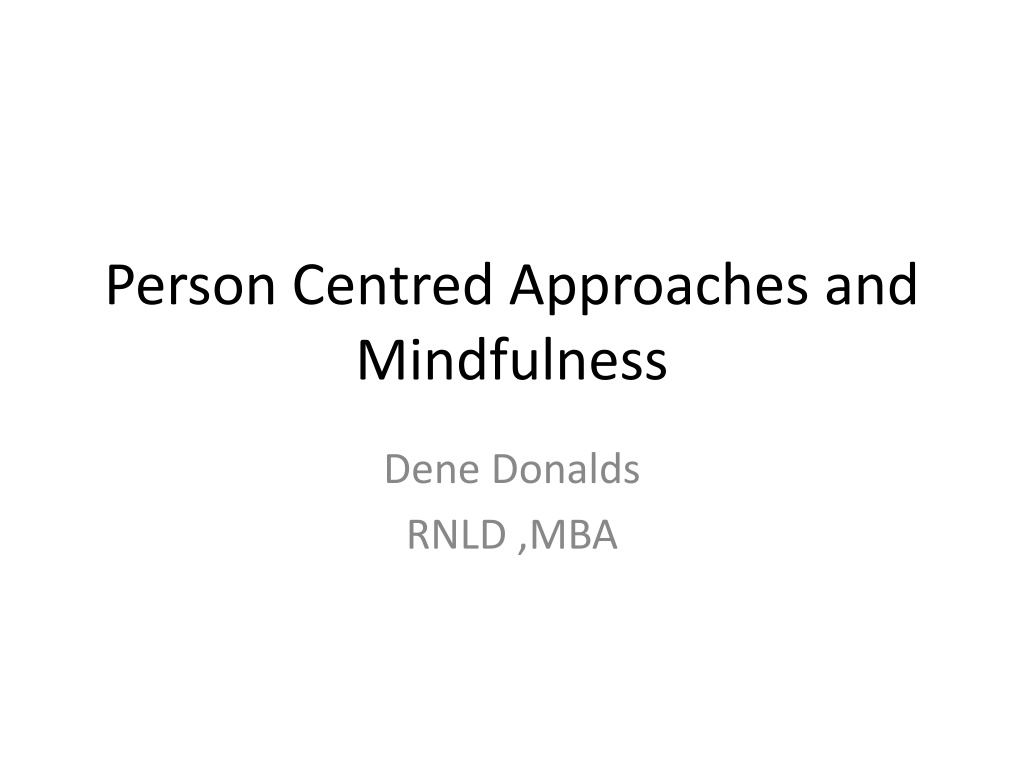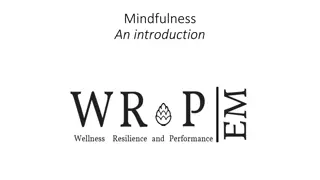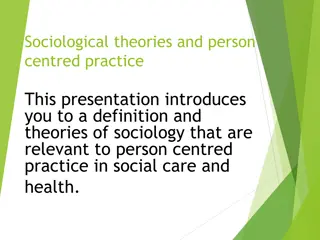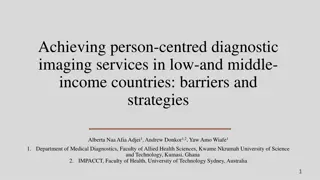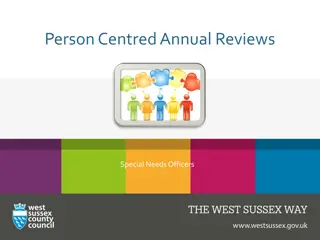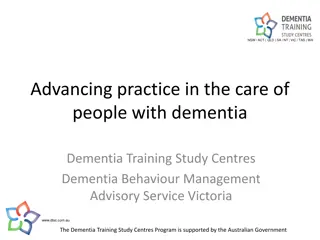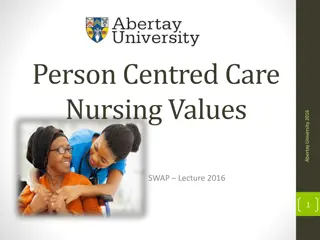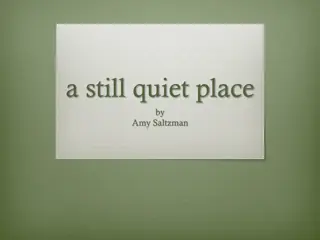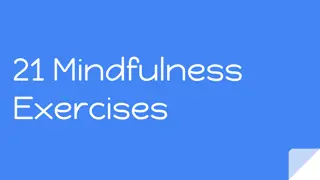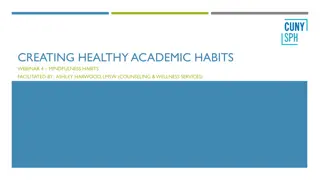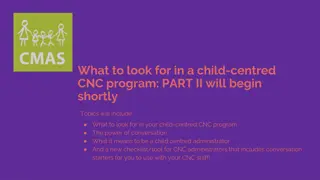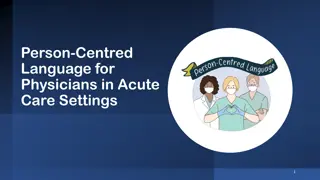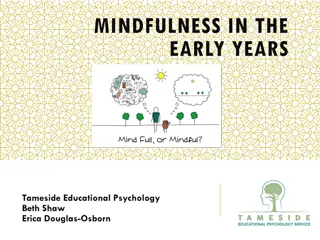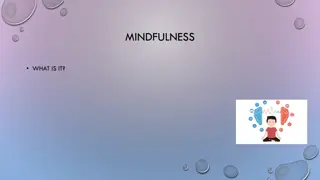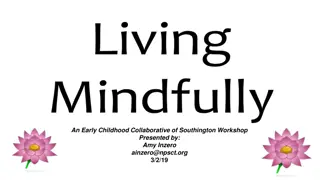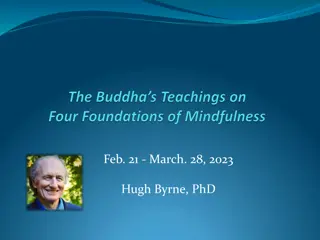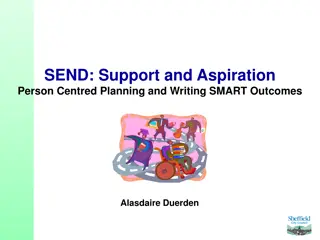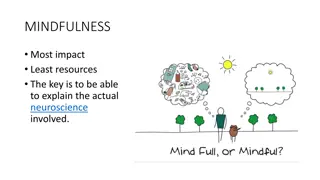Understanding Person-Centred Approaches and Mindfulness
Exploring the significance of person-centred thinking in supporting individuals in services, focusing on the importance of mindset over the planning process. Various tools, such as one-page profiles, 'working/not working,' and communication charts, are discussed to facilitate a holistic approach towards understanding and acting upon individual needs.
Download Presentation

Please find below an Image/Link to download the presentation.
The content on the website is provided AS IS for your information and personal use only. It may not be sold, licensed, or shared on other websites without obtaining consent from the author. Download presentation by click this link. If you encounter any issues during the download, it is possible that the publisher has removed the file from their server.
E N D
Presentation Transcript
Person Centred Approaches and Mindfulness Dene Donalds RNLD ,MBA
Person Centred Approaches and Mindfulness Thinking Listening Speaking Acting or behaving
Person Centred Thinking For people being supported by services, it is not person centred planning that matters as much as the pervasive presence of person centred thinking. If people who use services are to have positive control over their lives, if they are to have self directed lives within their own communities then those who are around the person, especially those who do the day to day work need to have person centred thinking skills. Only a small percentage of people need to know how to write good person centred plans, but everyone involved needs to have good skills in person centred thinking, in the value based skills that underlie the planning. Helen Sanderson
Person Centred Thinking There are a number of reasons for this; It is more likely that plans will be used and acted on; that the lives of people who use services will improve There will have a number of ways to get plans started Updating the plans will occur naturally , needing less effort and time
Person Centred Thinking Every type of person centred planning is interdependent on a person centred way of thinking. Made up from a set of value-based skills and tools that result in perceiving the person differently and give us a way of acting on what is learned in a holistic way. Training in person centred planning is training in a way of thinking as much as it is in a way of developing a plan.
Person Centred Thinking Do we agree with the statements in relation to person centred thinking?
Person Centred tools Person-centred thinking tools in common use include one-page profiles, 'working/not working', 'important to/important for', 'good day/bad day', communication charts, 'doughnut' of staff roles and responsibilities, relationship circles, learning logs and person- centred reviews:
Person Centred Tools Person centred tools are helpful but its also about why the workforce and organisation is using them and what workforce and organisation is using them.
Type of workforce or organisation Fearful Reactive Frozen -non responsive Mindful Understanding Responsive Compassionate Feel the fear and do it anyway
What is Mindfulness? the awareness that emerges through paying attention on purpose, in the present moment, and non-judgmentally to the unfolding of experience moment by moment (Kabat-Zinn, 2003).
What is Mindfulness? Mindfulness is the practice of focussing attention in a non- judgemental, non-reactive way on the present moment and what is happening in an individual s mind, body and the world around them. Mindfulness forms the basis of mindfulness-based stress reduction(MBSR) and mindfulness-based cognitive therapy(MBCT) programmes and there is growing evidence of the benefits of mindfulness for managing a range of difficulties including stress, anxiety, depression, pain and disordered eating. Chapman and Mitchell 2012
Mindfulness-based Stress Reduction (MBSR) Developed in 1980s by Jon Kabat-Zinn An 8 week program (2.5 h per week + day of mindfulness+ daily practice) Guided mindfulness practices focused mainly on sensory awareness following the breath and body awareness Education about stress Gentle yoga and movement practices using awareness of breathing Developed initially for stress reduction of varied patient groups from chronic pain to anxiety and heart problems-now used wider . Well documented beneficial effects on stress reduction and well- being (e.g., Hofmann, 2010) Have a direct effect on our perceptions and responses to situations
Mindfulness Based Cognitive Therapy Developed by Segal, Williams and Teasdale in the 1990s Targeting specific groups of patients with recurrent major depression while in remission to prevent relapse 85% MBSR + elements of Cognitive Behaviour Therapy (CBT) MBCT halved the rate of depressive relapse in patients with three or more past episodes (Teasdale, Segal & Williams, 2000) NICE recommend with certain groups
Person Centred Approaches and Mindfulness Where there is genuine person centred approaches there is mindfulness Where there is mindfulness there is person centred approaches
Person Centred Approaches and Mindfulness Supports the organisation to respond to situations rather than react. Supports the organisation to be open rather than closed
Mindful Guidelines for a Person Centred (Thinking) Approach Openness Open to exploring new and creative ways of doing things at a macro and micro level. See professional and academic qualifications and training as essential to guiding practice that helps us look at a situation or person holistically with awareness understanding and compassion: They are not doctrines to stick rigidly to at all costs. They are not doctrines which directly or indirectly exclude the experiences of people with learning disabilities and their families
Openness- a word of caution For a mature workforce openness recognises the importance of academic research, professional skills, experience training including person centred approaches, but at the same time works with compassion and understanding Openness is not an opportunity to disregard agreed guidance and organisational policy based on academic research, professional skills and training Openness is not about inconsistency or just doing what ever we feel like
Mindful Guidelines for a Person Centred(Thinking) Approach Non Attachment to Views Avoid being narrow minded and bound to present professional and academic views. Be open to others views insights and experiences in order to benefit from collective understanding rather than just your own. Understanding can be developed through mindful compassionate listening and letting go of judgements , rather than purely through the accumulation of intellectual knowledge. The academic and experiential knowledge we presently process is not changeless. Truth is found in day to day work and living. As well as valued professional expertise. Aim to observe thoughts, feelings, people and situations in every moment with the volition to learn throughout the continuous person centred planning process.
Group Exercise Produce Mindful Guidelines for a Person Centred Approach to: Listening Speech Acting
Person Centred Approaches and Mindfulness What next?
Person Centred Approaches and Mindfulness Dene Donalds RNLD, MBA dene@thelisteningpartner.cc
